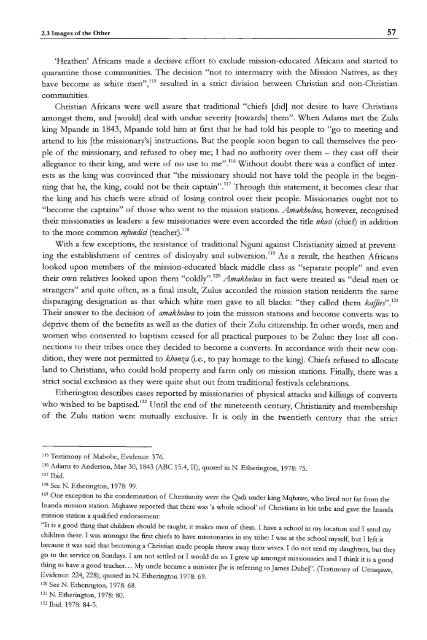South African Choral Music (Amakwaya): Song, Contest and the ...
South African Choral Music (Amakwaya): Song, Contest and the ...
South African Choral Music (Amakwaya): Song, Contest and the ...
You also want an ePaper? Increase the reach of your titles
YUMPU automatically turns print PDFs into web optimized ePapers that Google loves.
2.3 Images of<strong>the</strong> O<strong>the</strong>r 57<br />
'Hea<strong>the</strong>n' <strong>African</strong>s made a decisive effort to exclude mission-educated <strong>African</strong>s <strong>and</strong> started to<br />
quarantine those communities. The decision "not to intermarry with <strong>the</strong> Mission Natives, as <strong>the</strong>y<br />
have become as white men",115 resulted in a strict division between Christian <strong>and</strong> non-Christian<br />
communities.<br />
Christian <strong>African</strong>s were well aware that traditional "chiefs [did] not desire to have Christians<br />
amongst <strong>the</strong>m, <strong>and</strong> [would] deal with undue severity [towards] <strong>the</strong>m". When Adams met <strong>the</strong> Zulu<br />
king Mp<strong>and</strong>e in 1843, Mp<strong>and</strong>e told him at first that he had told his people to "go to meeting <strong>and</strong><br />
attend to his [<strong>the</strong> missionary's] instructions. But <strong>the</strong> people soon began to call <strong>the</strong>mselves <strong>the</strong> people<br />
of <strong>the</strong> missionary, <strong>and</strong> refused to obey me; I had no authority over <strong>the</strong>m - <strong>the</strong>y cast off <strong>the</strong>ir<br />
allegiance to <strong>the</strong>ir king, <strong>and</strong> were of no use to me".116 Without doubt <strong>the</strong>re was a conflict of interests<br />
as <strong>the</strong> king was convinced that "<strong>the</strong> missionary should not have told <strong>the</strong> people in <strong>the</strong> beginning<br />
that he, <strong>the</strong> king, could not be <strong>the</strong>ir captain".117 Through this statement, it becomes clear that<br />
<strong>the</strong> king <strong>and</strong> his chiefs were afraid of losing control over <strong>the</strong>ir people. Missionaries ought not to<br />
''become <strong>the</strong> captains" of those who went to <strong>the</strong> mission stations. Amakholwa, however, recognised<br />
<strong>the</strong>ir missionaries as leaders: a few missionaries were even accorded <strong>the</strong> title nkosi (chief) in addition<br />
to <strong>the</strong> more common mfundisi (teacher).118<br />
With a few exceptions, <strong>the</strong> resistance of traditional Nguni against Christianity aimed at preventing<br />
<strong>the</strong> establishment of centres of disloyalty <strong>and</strong> subversion. 119 As a result, <strong>the</strong> hea<strong>the</strong>n <strong>African</strong>s<br />
looked upon members of <strong>the</strong> mission-educated black middle class as "separate people" <strong>and</strong> even<br />
<strong>the</strong>ir own relatives looked upon <strong>the</strong>m "coldly".120 Amakholwa in fact were treated as "dead men or<br />
strangers" <strong>and</strong> quite often, as a final insult, Zulus accorded <strong>the</strong> mission station residents <strong>the</strong> same<br />
disparaging designation as that which white men gave to all blacks: "<strong>the</strong>y called <strong>the</strong>m kqffirl,.121<br />
Their answer to <strong>the</strong> decision of amakholwa to join <strong>the</strong> mission stations <strong>and</strong> become converts was to<br />
deprive <strong>the</strong>m of <strong>the</strong> benefits as well as <strong>the</strong> duties of <strong>the</strong>ir Zulu citizenship. In o<strong>the</strong>r words, men <strong>and</strong><br />
women who consented to baptism ceased for all practical purposes to be Zulus: <strong>the</strong>y lost all connections<br />
to <strong>the</strong>ir tribes once <strong>the</strong>y decided to become a converts. In accordance with <strong>the</strong>ir new condition,<br />
<strong>the</strong>y were not permitted to khonza (i.e., to pay homage to <strong>the</strong> king). Chiefs refused to allocate<br />
l<strong>and</strong> to Christians, who could hold property <strong>and</strong> farm only on mission stations. Finally, <strong>the</strong>re was a<br />
strict social exclusion as <strong>the</strong>y were quite shut out from traditional festivals celebrations.<br />
E<strong>the</strong>rington describes cases reported by missionaries of physical attacks <strong>and</strong> killings of converts<br />
who wished to be baptised. l22 Until <strong>the</strong> end of <strong>the</strong> nineteenth century, Christianity <strong>and</strong> membership<br />
of <strong>the</strong> Zulu nation were mutually exclusive. It is only in <strong>the</strong> twentieth century that <strong>the</strong> strict<br />
115 Testimony of Mahobe, Evidence: 376.<br />
116 Adams to Anderson, May 30, 1843 (ABC 15.4, II); quoted in N. E<strong>the</strong>rington, 1978: 75.<br />
117 Ibid.<br />
118 See N. E<strong>the</strong>rington, 1978: 99.<br />
119 One exception to <strong>the</strong> condemnation of Christianity were <strong>the</strong> Qadi under king Mqhawe, who lived not far from <strong>the</strong><br />
In<strong>and</strong>a mission station. Mqhawe reported that <strong>the</strong>re was 'a whole school' of Christians in his tribe <strong>and</strong> gave <strong>the</strong> In<strong>and</strong>a<br />
mission station a qualified endorsement:<br />
"It is a good thing that children should be taught; it makes men of <strong>the</strong>m. I have a school in my location <strong>and</strong> I send my<br />
children <strong>the</strong>re. I was amongst <strong>the</strong> first chiefs to have missionaries in my tribe: I was at <strong>the</strong> school myself, but I left it<br />
because it was said that becoming a Christian made people throwaway <strong>the</strong>ir wives. I do not send my daughters, but <strong>the</strong>y<br />
go to <strong>the</strong> service on Sundays. I am not settled or I would do so. I grew up amongst missionaries <strong>and</strong> I think it is a good<br />
thing to have a good teacher... My uncle became a minister [he is referring to James Dube)". (Testimony of Umaqawe,<br />
Evidence: 224, 228); quoted in N. E<strong>the</strong>rington 1978: 69.<br />
120 See N. E<strong>the</strong>rington, 1978: 68.<br />
121 N. E<strong>the</strong>rington, 1978: 80.<br />
122 Ibid. 1978: 84-5.

















